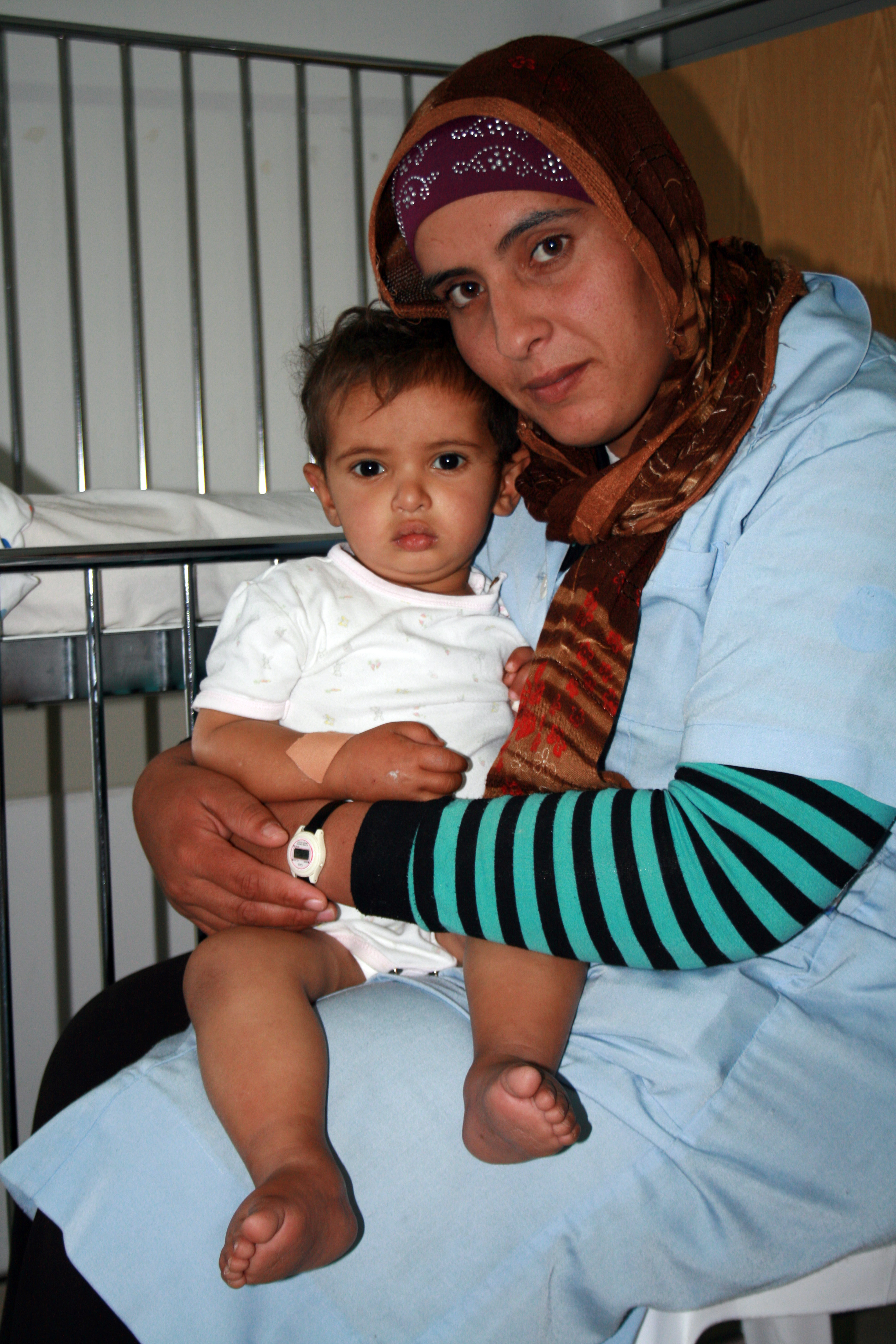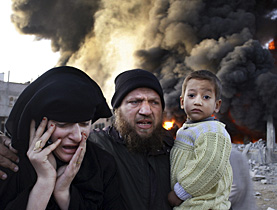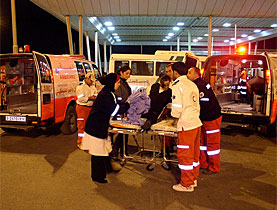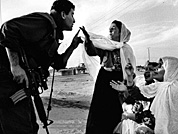Bringing medical aid to Bethlehem’s babies

Every year since 1963 the Catholic churches in Switzerland have donated the offerings taken at Midnight Mass to support the Caritas Baby Hospital in Bethlehem.
This year the donations are more needed than ever as the children’s hospital – the only one in the West Bank – embarks on the second phase of an ambitious expansion and renovation project.
The Christmas givings are vital, covering around one-third of the hospital’s budget, as its head of communications Erwin Schlacher explained to swissinfo.ch at his office in Bethlehem.
It costs around SFr15 million ($14.4 million) annually to run the facility, which last year treated more than 4,000 children as inpatients and around 30,000 as outpatients.
Patients come from all over the West Bank, where the hospital has built up a reputation for excellent care. The fact that the treatment is available at low, or even no cost, means anyone in need can access its services. Social background and religion are not taken into account.
“Children are helped because they need help and not because they have a certain origin,” says Schlacher.
The Caritas Baby Hospital stands above the town of Bethlehem in a Christian district. A low rise building of local sandstone, it blends in with its surroundings. Opposite the entrance on Caritas Street the Israelis have erected their security wall, cutting the two major sites of Christianity – Bethlehem and Jerusalem – off from one another.
The story dates back to Christmas Eve 1952 when Swiss priest Ernst Schnydrig, on his way to the Church of the Nativity, witnessed a distraught father burying his child near a Palestinian refugee camp. He resolved that never again should a child be deprived of medical care in the birthplace of Christ. He rented a house, filled it with 14 beds, and the Caritas Baby Hospital was born.
The growing need of the local population made it necessary to expand the hospital premises and its services. Demand for outpatient care, in particular, has increased massively in recent years.
Preventive medicine and social outreach are an important part of the hospital’s function, and mothers are now being offered the opportunity to receive hygiene and disease prevention training in the mothers’ centre while their children are being treated. It’s in line with the holistic approach that the hospital favours.
Business as usual
Work to extend the original building and construct a new wing, which began in 2008 and is expected to be completed by 2011, is budgeted to cost around SFr4.5 million.
The Swiss Agency for Development and Cooperation, which has an office in Jerusalem, has contributed SFr1 million to cover the costs of the new outpatients clinic. International lift company Schindler, which is based in Lucerne, has donated a new elevator.
It was business as usual during swissinfo’s visit in the second week of December, just weeks after the opening of the outpatients wing and the completion of the extension to the mothers’ accommodation.
In the original hospital building medical director Hiyam Marzouqa was doing her rounds of the premature baby and children’s wards. Most of the newborns had been admitted suffering infection of the blood or jaundice, but the German-trained doctor said recently there had been an increase in cases of babies with a low body temperature.
“We have cold temperatures in winter and the houses are not adapted to these temperatures. There is no money for heating, and the newborns don’t have fat under the skin so they get cold easily.”
Dr Hiyam stops by the cot of a one-month-old baby girl, who is as tiny as a newborn. “These cases we see often where a two-month-old baby has not gained weight since birth, or a nine-month-old is just five kilograms. This is something common,” she says.
Although the hospital treats children of all ages, most of the patients are aged under three. Most problems occur in the first year of life, and newborn mortality is high – four times higher than in Switzerland.
In another room an emaciated baby with grey skin lies sucking his thumb. His prospects are bleak. He was admitted to the hospital late where it was discovered that most of the intestine was gangrenous. Now the short bowel is also diseased. Because he is not able to absorb food properly, he is not gaining weight.
“Sometimes when you look at the eyes of such babies you feel they need help, they are crying for help and you cannot help. This is frustrating.”
Mother and child
In the extended mothers’ unit a few women were talking or resting in the shared bedrooms. This is the domain of Sumaya Asmary, the supervisor of the mothers’ department, and a hospital employee for 30 years. In the common room she gives daily talks on child development, hygiene, nutrition and spread of infection, in short “everything for mother and child”.
Meanwhile, downstairs in the newly constructed outpatients clinic Doctor Bishara Nasrallah and nursing staff were dealing with the usual winter cases of flu and chest infections. It had been a busy week – 100 cases on Monday morning alone – and the Friday morning rush was in full swing. Doctors carrying files hurried down corridors and nurses weighed and measured babies before they were seen by the paediatrician.
Parents and children filled the brightly painted waiting room, adorned with a large decorated Christmas tree – one of the few signs of the approaching festive season.
“Christmas, like everything in the Holy Land, is not just one situation,” says Schlacher with a small sigh. “Here all the different religions live in a very small area. The Catholics and Protestants have Christmas on December 25, the Orthodox have it on January 7 and the Armenian Christians have it on January 19.
“So Christmas lasts nearly a month here!” “But on the other hand life continues, because even at Christmas children get sick. Christmas, New Year or Easter, children need help always.”
Morven McLean in Bethlehem, swissinfo.ch
Population: 2.4 million (Switzerland: 7.6 million)
Size in square kilometres: 5,600 (Switzerland: 39,000km)
GDP per head of population: $2,900 (Switzerland: $40,900)
Birth rate per thousand: 25.9 (Switzerland: 9.6)
Fertility rate per woman: 3.3 (Switzerland: 1.4)
Child mortality per 1,000 live births: 16.5 (Switzerland: 4.23)
Life expectancy: 74 years (Switzerland: 81)
Hospital beds per 1,000 people in Palestinian
Territory: 130 (Switzerland: 567)
Doctors per 1,000 people in Palestinian Territory: 97 (Switzerland: 389)
1952: the Caritas Baby Hospital was founded by Father Ernst Schnydrig, along with Palestinian doctor Antoine Dabdoub and the Swiss, Hedwig Vetter.
1963: the German Caritas association and Caritas Switzerland set up Children’s Relief Bethlehem to run the Caritas Baby Hospital.
1970: a nursing school was opened. In 1999 it was recognised as a college.
2008: Construction work begins on new outpatients clinic and extended mothers’ accommodation. Palestinian President Mahmoud Abbas visits.
2009: Pope Benedict XVI visits in May, describing the hospital as “a beacon of hope that love can prevail over hatred and peace over violence.


In compliance with the JTI standards
More: SWI swissinfo.ch certified by the Journalism Trust Initiative



You can find an overview of ongoing debates with our journalists here. Please join us!
If you want to start a conversation about a topic raised in this article or want to report factual errors, email us at english@swissinfo.ch.